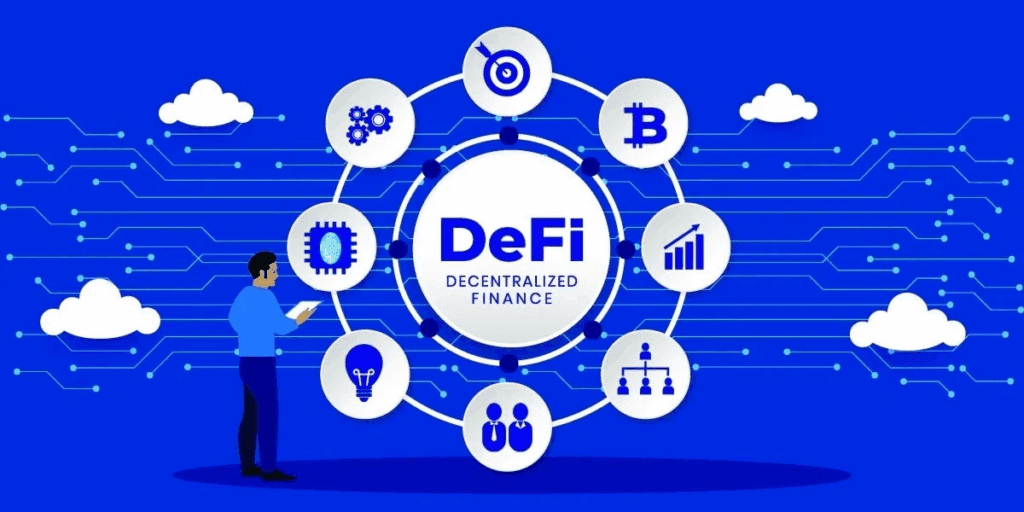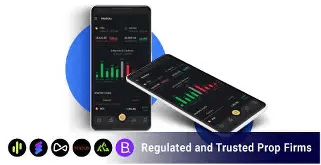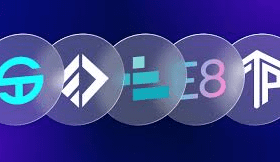This article will focus on the Prop Firm Types Dominating Forex, Crypto, and Stock Markets. Prop firms changed the landscape of trading by offering capital, sophisticated resources, and professional assistance to traders.
Ranging from instant funding to DeFi-native to regulated firms, each type comes with distinctive benefits, enabling traders to optimize profit potential, control risk, and open several markets with low personal investment. This all comes with the very little investment from the trader’s side.
What is Prop Firm?
A proprietary trading firm is a company that gives traders access to its own capital to trade various financial assets, including forex, equities, and cryptocurrency. Proprietary trading firms allow traders to use their money and then share profits so that traders do not have to risk their capital to earn a return.
A traders is evaluated on their risk and money management, performance consistency, and trading strategies during their sponsored trading ‘challenge’. Take on challenges to gain access to the firm’s capital to trade and earn high profits relative to personal trading. Firms profit with little risk by letting traders compete in high-stakes with personal trading capital.
Why Use Prop Firm Types Dominating Forex, Crypto, and Stock Markets
Higher Access to Capital
Profitability in trading is highly correlated to the amount of capital available. Prop firms bridge the gap providing traders with access to more money than they own. This allows traders to scale much faster.
Minimal Personal Risk
Traders do not have to use their own money. Losses sustained when trading professionally with prop firms are evaluation and subscription fees. This makes prop firms less risky than other trading alternatives.
Performance Incentives
Most prop firms have scaling plans or increased funding made available to consistently profitable traders. This incentivizes discipline and sustained profitable performance, as no capital is needed.
Advanced Tools and Mentors
Modern trading firms offer much more than capital. They provide mentorship, advanced trading platforms, analytical and educational resources, and much more, all aimed towards improving a trader’s competitive edge and refining their approach.
Access to Different Markets
Most modern prop firms have a combination of Forex, Crypto and Stock markets. This allows traders to diversify their portfolios, hedge, and take advantage of more trading opportunities.
Prop Firm Types Dominating Forex, Crypto, and Stock Markets Points
- Instant Funding Firms – Offer traders immediate access to capital without lengthy evaluation challenges.
- Scaling Plan Firms – Reward consistent traders by gradually increasing their funded account size.
- Crypto-Focused Firms – Specialize in digital asset trading, offering funding for crypto spot and derivatives markets.
- Stock & Options Firms – Provide capital for equity and options traders to leverage advanced market strategies.
- Futures Prop Firms – Focus on futures contracts across commodities, indices, and interest rate markets.
- DeFi-Native Prop Firms – Integrate decentralized finance protocols for transparent and on-chain trading operations.
- Broker-Backed Firms – Operate in partnership with brokers to ensure better liquidity, spreads, and execution quality.
- Remote Desk Firms – Allow traders worldwide to access firm capital and trade from anywhere.
- Regulated Prop Firms – Adhere to financial regulations, offering enhanced transparency and trader protection.
9 Prop Firm Types Dominating Forex, Crypto, and Stock Markets
1. Instant Funding Firms
In the Forex, Crypto, and Stock markets, Instant Funding Firms are among the dominant types of prop firms as they remove lengthy evaluation periods and grant traders immediate access to trading capital.

This immediate model enables proficient traders to exploit market opportunities instantaneously, bypassing the cumbersome multi-challenge rounds. Their primary differentiator is the ability to demonstrate real-time consistency within live markets.
By focusing on the removal of entry barriers and real-time performance, as opposed to the fictive performance of ‘trading tests’, instant funding firms are gaining a fresh assortment of autonomous traders who are burgeoning outriders passionate about real trading liberty.
Pros & Cons Instant Funding Firms
Pros:
- Enables immediate market entry by providing trading capital.
- Eliminates long waiting periods for evaluations and challenges.
- Facilitates live trading focus which enhances performance.
Cons:
- Accounts are easily affected by trading mistakes.
- Limited predictability due to inadequate support, which is typical with scaling firms.
- In order to avoid huge losses, risk averse firms will impose strict control measures.
2. Scaling Plan Firms
Scaling Plan Firms are becoming a dominant kind of prop firm in the Forex, Crypto, and Stock markets, as a result of rewarding consistency and disciplined growth. These firms allow traders to incrementally boost their funded capital depending on performance milestones.

This approach fosters a sustainable trading journey, as opposed to a one-time payout. The unique strength of scaling plan firms is their ability to align the success of the trader with the profitability of the firm, creating long-lasting partnerships instead of pursuing short-term wins.
The harmonious combination of risk management, gradual capital growth, and performance incentives is what attracts serious traders to these firms. Such traders are focused on professional, scalable, and career-oriented trading.
Pros & Cons Scaling Plan Firms
Pros:
- Increased funding for highly capitalized accounts.
- Promotes discipled, long-term profitable trading.
- Gradual funding alleviates being over-leveraged.
Cons:
- For new entrants, capital growth is slow.
- Higher funding requires sustained performance over long periods.
- For over-heated, high-risk traders, scaling may feel restrictive.
3. Crypto-Focused Firms
The highly innovative nature of digital assets has made prop business models in Forex, Crypto, and Stock markets increasingly crypto-focused. Such firms are particularly funding traders who are highly skilled in the crypto spot and derivatives markets, capitalizing on the unique characteristic of the crypto markets, 24/7 trading.

These firms are also able to process inflows and outflows of capital in real time and track the performance of clients in a decentralized manner, which is a result of the transparency provided by the blockchain.
Embracing digital innovations such as AI, on-chain crypto analytics, and a variety of crypto trading pairs, crypto-focused firms appeal to traders who are technically oriented and want the high volatility ranges crypto assets provide as well as the rapid innovations of digital money systems.
Pros & Cons Crypto-Focused Firms
Pros:
- Focus on specialized crypto markets and derivatives.
- Due to the global nature of crypto, there are 24/7 trading opportunities.
- Access blockchain analytics.
Cons:
- Intense crypto market fluctuations may result in huge losses.
- Compared with traditional markets, there is less market control.
- Requires extensive knowledge of crypto-assets and market behavior.
4. Stock & Options Firms
With access to equity and options trading alongside institutional level tools, Stock & Options Firms are emerging as the leaders among prop firm types in the Forex, Crypto and Stock markets.

These firms allow traders to employ sophisticated techniques like hedging, volatility trading, and constructing market-neutral strategies, which are almost never offered in standard prop setups. Their distinct advantage is being able to offer tailored leverage with active real-time risk control, allowing traders to exploit opportunities within the constraints of disciplined risk control.
Stock and Options Firms are closing the gap between retail and institutional trading with professional tools, education and flexible risk capital, while changing the way traders access the opportunities offered by the dynamic global markets.
Pros & Cons Stock & Options Firms
Pros:
- Can use complex strategies like hedging and options trading.
- Gain access to equities and options along with professional trading tools.
- Can offer customized leverage along with structured risk management.
Cons:
- Accessibility is limited to stock market trading hours.
- Options trading and derivative strategies require significant understanding.
- Compared to high volatility markets like crypto, the potential to earn is slower.
5. Futures Prop Firms
A new type of business in Forex, Crypto, and Stock trading is called Futures Prop Firms. This is because they focus on high-liquidity instruments and offer global market access. These companies allow traders to access professional funding to trade futures contracts on commodities, indices and currencies.

These firms provide tailored leverage and risk management which provide unique solutions on high risk futures contracts which require specific attention to detail and timing.
These Prop Firms offer real-time analytics, quick trade execution and scalable profit sharing which attract disciplined traders looking for reliable earnings. These firms provide institutional grade infrastructure to traders which redefine trading opportunities in the world.
Pros & Cons Futures Prop Firms
Pros:
- Trade liquid futures contracts with high leverage.
- Trade commodities and access the indices and currencies.
- Advanced analytics and risk management tools.
Cons:
- Large leverage increases the risk of significant loss quickly.
- Needs expertise on the futures contracts and expiry cycles.
- Novice traders are challenged with extreme market volatility.
6. DeFi-Native Prop Firms
DeFi-Native Prop Firms are innovating proprietary trading on the Forex, Crypto, and Stock markets by designing their very own decentralized finance protocols.

In contrast to conventional firms, they utilize the transparency offered by blockchains and on-chain settlements to fund their traders with real-time confirmations of trades and automated payouts. Most importantly, the firm’s proprietary isolation of risk, performance, and reward in the fully automated system works to their advantage.
Access to liquidity pools, crypto derivatives, and automated trading in the firm’s algorithms provide a great opportunity for inventive traders looking for borderless, trustless, and highly efficient trading. This is what positions the firm in the forefront of the contemporary financial markets.
Pros & Cons DeFi-Native Prop Firms
Pros:
- Uses distributed ledger technology and smart contracts.
- Automated verification of trades and instant settlement.
- DeFi-natives tend to attract innovative traders.
Cons:
- High volatility of crypto markets.
- Knowledge of DeFi protocols and onchain tools is critical.
- Evolving regulations may increase risk.
7. Broker-Backed Firms
Broker-Backed Firms are dominating the forex, crypto, and stock markets by collaborating directly with licensed brokers. These firms provide their traders with superior execution, enhanced liquidity, and direct access to the markets.

Broker-Backed Firms are not independent prop firms. They have the unique advantage of broker integration which guarantees tighter spreads, quicker trade execution, and dependable order routing. This integration enables traders to work with the firm’s capital in advanced professional-grade trading conditions.
Broker-Backed Firms merge credibility and stability of regulated brokers with profit-sharing models; consequently, they attract serious traders looking for efficient high-speed, low-latency trading with dependable trading performance. Thus, Broker-Backed Firms have positioned themselves as modern proprietary trading firms.
Pros & Cons Broker-Backed Firms
Pros:
- Partnered brokers provide improved liquidity and trade execution.
- Professional environment of trading with tight spreads.* Compliance is often overseen indirectly through broker partnerships.
Cons:
- Platform selection or broker rule alignment may be more rigid.
- Partners may be more costly.
- Focus more on innovative trading and decentralized models.
8. Remote Desk Firms
Remote Desk Firms are revolutionizing the way traders operate in the Forex, Crypto, and Stock markets by providing access to proprietary capital no matter where you are in the world.

Unlike traditional firms, which necessitate an in-person presence, these companies offer fully virtual ecosystems for trading that provide security, are monitored in real-time, and track performance. They are flexible; traders can operate across different time zones and markets, meaning that there are no geographic barriers and talent can be acquired globally.
These firms are able to provide expansive opportunities by integrating cloud technology, instantaneous funding, and sophisticated risk management tools. This makes these firms a dominant prop trading business.
Pros & Cons Remote Desk Firms
Pros:
- Unlimited geography.
- All monitoring and support is on the internet.
- Flexible across and within time zone ranges.
Cons:
- Dependable internet and a computer.
- Fewer face-to-face support and group learning.
- Access to some markets might not be allowed.
9. Regulated Prop Firms
Regulated proprietary firms are gaining significance across Forex and Crypto markets, as well as Stock markets. This is due to their adherence to Financial regulation which guarantees safety and accountability.

These firms offer traders a safe, legally compliant trading environment which protects capital and profit-sharing. Their greatest advantage though is the trust they build, as traders know they can safely implement their strategies due to the compliance, risk control and reporting standards that are maintained.
The combination of regulation and performance funding, sophisticated tools, and access to the markets is what attracts professional traders looking for Regulated Prop Firms, where they gain recognition for reliability and consistent business growth. This is the goal of modern proprietary trading.
Pros & Cons Regulated Prop Firms
Pros:
- Regulated means safety and disclosure is guaranteed.
- Transparency builds trust with clients.
- Legal standpoints offer power on the distribution of profits and capital.
Cons:
- More paperwork slower clients.
- Compliance means hiding in the proverbial box.
- Compliance means no unconventional or reckless risk.
Conclusion
To summarize, considering the varying kinds of prop firms—such as Instant Funding, Scaling Plan, Crypto, Futures, DeFi-Native, Broker-Backed, Remote Desk, and Regulated Prop Firms—are shifting the landscape of Forex, Crypto, and Stock markets.
Instant access to capital, growth potential, sophisticated tools for the market, and safety net of regulations are some of the benefits these diversified forms of prop firms deliver.
They provide the means to professional trade, scale, diversify and operate above and beyond the limits of personal capital. As these prop firms focus on innovation, seamless access, and risk-adjusted performance, it shows the evolving markets and their focus on the future of trading.
FAQ
They allow traders to start trading with capital immediately, eliminating long evaluation periods and letting skilled traders capitalize on live market opportunities.
They gradually increase a trader’s funded capital based on consistent performance, rewarding discipline and long-term growth.
They specialize in digital assets, offering access to crypto markets, derivatives, and blockchain-based trading tools.
Firms that fund traders in futures contracts, providing leverage, real-time analytics, and professional risk controls.
They integrate decentralized finance protocols, using blockchain transparency and smart contracts for secure, automated trading.












Got a Questions?
Find us on Socials or Contact us and we’ll get back to you as soon as possible.